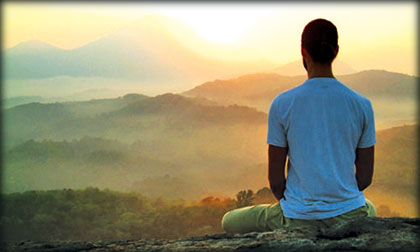Meditation as a stress buster
.jpg) Vesak is an ideal occasion for meditation. Even on other Poya days
Buddhists flock to temples and meditate. However, meditation is not
confined to Buddhists. Even non-Buddhists in the affluent West have
turned to meditation to get rid of stress and other ailments. Therefore,
it is pertinent to inquire into the process of meditation. Vesak is an ideal occasion for meditation. Even on other Poya days
Buddhists flock to temples and meditate. However, meditation is not
confined to Buddhists. Even non-Buddhists in the affluent West have
turned to meditation to get rid of stress and other ailments. Therefore,
it is pertinent to inquire into the process of meditation.
Many people who made an attempt to meditate for the first time would
say that nothing really happened during meditation. However, those who
regularly meditate say that they experience a deep mental relaxation and
emotional calm. Some people who meditate claim that meditation brings
about new knowledge and insight. What is more, those who do advanced
meditation claim that it brings them into direct contact with the spirit
world.
If you observe a person meditating you will see him seated on the
floor usually with closed eyes, spinal column straight and not doing any
physical activities. The duration of the meditation can vary from 15 to
20 minutes. Some people meditate even for longer spells of time.
To those who have never attempted to meditate, meditation may seem to
be a waste of time.
Drowsiness
It is usual for a beginner who tries to meditate to get a feeling of
drowsiness. And he might think that it is an ideal way of preparing for
sleep. But this is far from the truth.
 The benefits of meditation have been proved scientifically. Maharishi
Mahesh Yogi introduced Transcendental Meditation (TM) to the western
world. Scientific studies in the West prove that the correct practice of
meditation could bring about better mental health, decrease in high
blood pressure and improved memory power. What is more, those who
meditate do not behave in an aggressive manner. The benefits of meditation have been proved scientifically. Maharishi
Mahesh Yogi introduced Transcendental Meditation (TM) to the western
world. Scientific studies in the West prove that the correct practice of
meditation could bring about better mental health, decrease in high
blood pressure and improved memory power. What is more, those who
meditate do not behave in an aggressive manner.
Meditation has been defined by many people in different ways. For
instance, Charles C. Wise Jr., the author of Meditation, Prayer, Healing
and the Psychic, says, "(Meditation is) the process of learning and
knowing...(It) is a mental discipline in which relationships are
revealed. It is a process of pattern-recognition in which the mind is
raised above the particulars to receive the universals which give
coherence to the particulars."
Meditation and prayer
American psychic Edgar Cayce refers to meditation as "The emptying of
ourselves of all that hinders the creative force from rising along the
natural channels of our physical bodies to be disseminated through the
sensitive spiritual centres in our physical bodies." He says that
meditation differs from prayer. "In prayer we speak to God, in
meditation, God speaks to us."
Psychology views meditation in a different light. According to
psychology our brain waves operate at 14 cycles per second during normal
waking hours. This is known as the Beta rhythm. During meditation, the
brain wave frequency goes down to about 8 to 13 cycles per second. This
is called the Alpha rhythm. What is significant is that what the brain
cannot do in normal circumstances (the Beta state), can be done during
the Alpha state. During the latter state, it is claimed, a person can
experience Extra Sensory Perception (ESP).
It is a misconception that the mind becomes inactive during deep
meditation. In fact, it becomes more active and powerful. In deep
meditation the mind operates on a different plane giving it a new
dimension.
Powerful unit
Psychological research shows that meditation helps to harmonise the
activities of the left and right hemispheres of the brain. The left
hemisphere of the brain is associated with logical and sequential
thinking. The right hemisphere of the brain, on the other hand, is
associated with intuition and creativity. When we meditate the two
hemispheres of the brain begin to function as one powerful unit.
Most city dwellers have the habit of spending a few days in the
country to get rid of stress, a legacy of modern civilisation. A
character in one of Dostoevsky's novels digs a hole in the ground and
lives there for the rest of his life. When asked why he was doing so, he
replies: "The only contribution of modern civilisation to man is to
increase his variety of sensations and absolutely nothing else."
Dostoevsky is not far from the truth. However, no civilised man,
except a terrorist, can live in a hole in the ground or an underground
bunker. Meditation appears to be the only solution to most of the
psychological problems created by modern civilisation.
|

